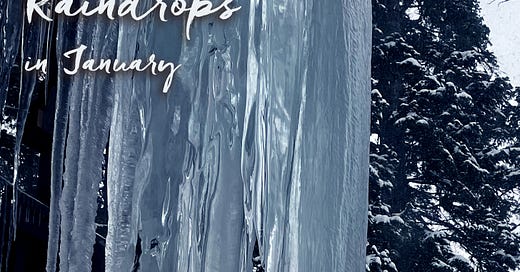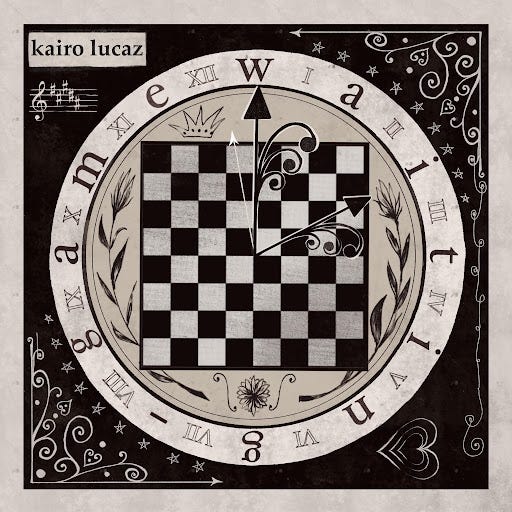Raindrops in January… don’t we wish. For some of us those raindrops have crystalized into many, numerous, very cold, snowflakes, and for others the raindrops came too late. I’m relieved to share all of my friends and colleagues in Los Angeles are safe.
The image above is of a magnificent sheet of ice two stories tall, three years ago up in Lake Tahoe. That was the year we had single-digit (Fahrenheit!) nights—so cold the interior of my car frosted over. But boy was it gorgeous outside. Nothing like snow and ice, assuming you’re prepared for it.
Raindrops explores the fields of Art, Music, Writing, and Film. In this edition, we make appeal to protect our copyright, tease a new fiction work, and welcome a new voice to the field of music.
Stay hungry. Stay subscribed.
Music
You know what’s music to my ears? Soft flakes of snow landing on my face. The hush of water burbling over rounded stones. The scent of the Christmas tree we didn’t cut down because we have it potted in our house. Whipped steam rising from a cut of hot dark cocoa. The laughter of children across the street, in that little mini-park where people walk their dogs.
All this is Music. Our world is awash in it, but we don’t call it music. Music is rhythm and flavor and pitch and pulses of things that make you feel. And music is also the stuff that we humans compose, perform, and dance to.
Recently I started listening to the old classic songs of the 1950’s and 60’s. Twilight Time and Smoke Gets In Your Eyes. In the Still of the Night. The unbearably evocative The Lion Sleeps Tonight. Come Go With Me. All these songs were written and sung long before autotune, digital instruments, and certainly anything AI-generated.
All these songs were born long before my time, and even longer before my daughter’s time. She’s just 14, but she listens to music from the 1940’s, 50’s, 60’s, all the way through to today. The Beatles. Frank Sinatra. The Strokes (her absolute favorite band). She doesn’t always agree with my own preferences but graciously tolerates them.
Turns out she’s got hella voice, and musical talent. Plays piano, guitar (acoustic, electric, and bass), drums, and her vocals aren’t bad either. For the past several months she’s been working on her first song, titled “Waiting Game.” I’m thrilled to share it with you here. Please welcome… kairo lucaz (her musical nom de plume).
This is truly a one-teen effort... original lyrics, vocals, backup vocals, all instrumentation, and mixing. And cover art too. I had nothing to do with it, because I don’t have a musical bone in my body—other than the ability to appreciate good music. As for AI or auto-tune, you won’t find any here. This young musician is staunchly in favor of mastering the craft, with your own voice and your own hands.
Stay tuned next week for a special mama-daughter Q&A on the genesis and meaning of “Waiting Game.” And please let us know what you think of the song—I’ll be sure to share your comments with the young artist.
“Waiting Game” is available on Apple Music/iTunes, Spotify, Deezer, Pandora, Tidal, and others.
Publishing
Writing is my favorite professional activity because I love to travel and explore new things. What better—and cheaper—way to go anywhere you want, in any time period, with anyone you please? All without the trouble of lugging suitcases, running through traffic, sleeping off jet lag, and spending ungodly amounts of money. You just write it into existence. Of course, actual travel helps with the metaphorical travel, and vice versa.
It’s especially invigorating when you take on a new format. If you’ve written mostly short stories, your first novel feels like scaling a mountain. If you’ve written mostly novels, that first short story can feel like falling off one.
Over the years I’ve written numerous types of works: short stories, novellas, a novel, poetry, a photography book, film scripts, essays, articles, blog posts, reports, and so on. Never a graphic novel.
Till now.
It’s a whole new learning process and I’m enjoying every step. It’s a fragrant blend of film script, animation, and short story, based on original characters and a story concept my daughter created some years ago for one of her projects. There’s a little fantasy (ok maybe a lot), a little drama and tension (ok maybe a fair amount), a few epic battles (but not like you’re used to), and a deeper message (obvs!).
We’re exploring a few different venues for publication; stay tuned on that. For now, the goal is to finish the script and establish the visual style.
If you’ve ever written a graphic novel or comic script I’d love to hear about your experience!
Everything, Everywhere, AI at Once
While you sleep, people on the other side of the world are busy changing the way you’ll work tomorrow. Or whether you’ll work at all tomorrow. These are people you’ll likely never meet. You might not ever see their faces. Know their names. Stand in front of them in the coffee line, or behind them at airport security.
They are the legislators who hold the power over the legal structures governing society’s concept of ownership, use, distribution, and monetization. They’re the ones being wined, dined, and pressured/bullied by tech companies whose business model is to scrape first and ask no questions later. The same tech companies that rise up in non righteous anger when other (foreign) tech companies basically do the same thing to them that they’ve done to the little people.
Copyright has legally protected creators’ works since the early 1700’s. The first copyright statute was the Statute of Anne of 1710, its full title the very brief “An Act for the Encouragement of Learning, by vesting the Copies of Printed Books in the Authors or purchasers of such Copies, during the Times therein mentioned.” The very term “copyright” originally referred to the right to make copies of a book, not translations or derivative works; it was us authors and publishers whose works were first protected under this innovative legal framework. Artists, musicians, filmmakers, and other creators were brought in from the cold later on, over time.
In the United States, copyright is enshrined in the Constitution—yes, the very same founding document of our nation currently being shredded. Take the time to let these words wash over you:
“In 1790, the Constitution enshrined in American law the principle that an author of a work may reap the fruits of his or her intellectual creativity for a limited amount of time.”1
This principle, this concept that we who create original works, own these works, and have the right to benefit from our creativity, is enshrined in our Constitution. I’d go so far as to say it’s deeper than that—the right to your own work is a human right.
Last month I wrote about an effort currently ongoing in the UK that might strip away copyright protections from creators there. The irony—that this is the same place that issued the world’s first copyright statute—is most bitter indeed. No amount of sugar can fix this tea. Make no mistake however, that what befalls creators in one country, is sure to impact creators in other countries. When the dominoes are lined up properly, it takes just one little hit, and it’s lightning fast.
We’ve got till February 25 to speak up, or potentially forever give up our copyrights. I’d say it’s worth the time this takes to read and send in your comment.
Source: “A Brief History of Copyright in the United States,” U.S. Copyright Office. Accessed online on January 29, 2025 at https://www.copyright.gov/timeline/.








love the song, love the words, love your writing....